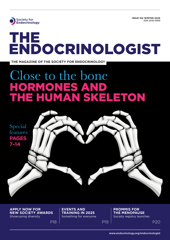This article by Stratton and colleagues investigates low levels of anti-Müllerian hormone (AMH) in patients with an inherited bone marrow failure syndrome, such as Fanconi anaemia, dyskeratosis congenita-related telomere biology disorders or Diamond–Blackfan anaemia.
The authors highlight that, in males, AMH may be a direct marker of Sertoli cell function and an indirect marker of spermatogenesis.
Their findings indicate a significant defect in the production of AMH in postpubertal males in the syndromes studied, with widespread implications for fertility potential. They call for action in further larger studies.
Read the full article in Endocrine Connections 13 e230510 https://doi.org/10.1530/EC-23-0510






